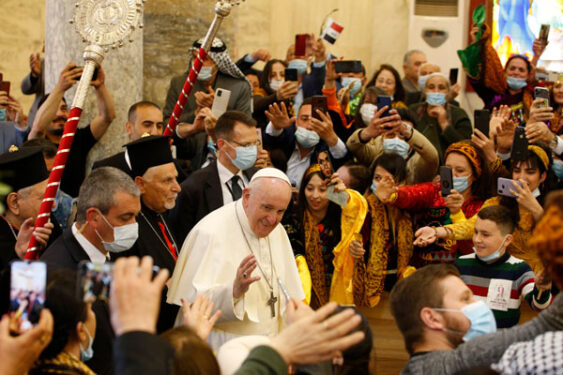
By Inés San Martín
QARAQOSH, Iraq (Crux) — Surrounded by the relics of violence, war, and terrorism, Pope Francis Sunday told the Christian community of Iraq that they’re proof in flesh and blood of the victory of life over death.
Speaking to a crowd that saw its girls and women sold as property by Islamic State terrorists, and on the eve of International Women’s Day, the pope gave a “heartfelt thank-you to all the mothers and women of this country, women of courage who continue to give life, despite the wrongs and hurts.”
“May women be respected and protected,” he said. “May they be shown respect and provided with opportunities.”
[Click here to read Pope Francis’ full speech to the Christian Community of Qaraqosh]
On Friday’s flight from Rome to Iraq, Pope Francis was hand-delivered documents from ISIS that detailed the price of women during their reign of terror in Iraq and Syria, between 2013 and 2017. Recovered by the papal charity Aid to the Church in Need, they show that a woman over 40 had a “cost” of $42, while $173 would “buy” a girl between one and nine.
The price list in Arabic and English equated “markets” of women and cattle, regretting that both had “sharply decreased” which “will affect Islamic State revenues as well as the funding of the fighters in the battlefield, therefore, we have made some changes,” before listing “updated” prices for Yazidi and Christian women slaves.
“Customers are allowed to purchase only three items with the exception of [items] from Turkey, Syria and the Gulf Countries,” rules to be obeyed, according to the ISIS document, under threat of death.
It’s possible the pope had this “price list” in mind when he heard the story of Doha Sabah Abdallah, a woman from Qaraqosh, who lost her young son when a mortar fell in the city several days before ISIS arrived.
She said they had left the city, fleeing the first attempts from ISIS to invade the Qaraqosh. But, three days later, everyone returned, because “being Christians, we are ready for martyrdom.”
Yet, on the morning of August 6, 2014, a mortar shell killed her small son and his cousin, as well as a young neighbor who was preparing for marriage.
“The martyrdom of these three angels was a clear warning. Were it not for that, the people of Baghdad would have remained and would inevitably have fallen into the hands of ISIS,” she said. “The death of the three saved the entire city.”
The pope picked up on Sabah’s call for forgiveness.
“Forgiveness — that’s a key word,” he said. “Forgiveness is necessary to remain in love, to remain Christian. The road to a full recovery may still be long, but I ask you, please, not to grow discouraged. What is needed is the ability to forgive, but also the courage not to give up.”
“We trust in [God] and, together with all people of goodwill, we say ‘no to terrorism and the manipulation of religion,” he said, repeating a request that has become the mantra of the trip.
History is reflected in the war-pocked face of Qaraqosh, a mostly Christian town on the Nineveh Plain that boasted 50,000 inhabitants before ISIS, 90 percent of whom were Christian. Most were forced to flee towards Erbil, the capital of Kurdistan, leaving behind their homes and belongings.
When they were allowed back in 2016, Christians found their homes devastated and churches desecrated in the place once known as the “City of the 10 Churches.” An estimated 45 percent of those who fled have gone back.
Qaraqosh is home to Iraq’s largest church, dedicated to Mary’s Immaculate Conception. When ISIS took control of the city in August 2014, the church was vandalized, profaned, and burned. The bell tower was partially destroyed and statues beheaded, while pews were thrown to the courtyard, and the choir area used as a shooting range.
It was inside this recently-restored church that Pope Francis addressed the Christian community of Iraq.
“How much has been torn down!” the pope said. “How much needs to be rebuilt! Our gathering here today shows that terrorism and death never have the last word. The last word belongs to God and to his Son, the conqueror of sin and death. Even amid the ravages of terrorism and war, we can see, with the eyes of faith, the triumph of life over death.”
The pontiff acknowledged that there are moments when the faith can waver, “when it seems that God does not see or act … Do not stop dreaming! Do not give up! Do not lose hope! From heaven, the saints are watching over us.”
Mounir Jbrahil, a 61-year-old math teacher who fled Qaraqosh for Erbil in 2016, was able to rebuild his destroyed home in 2020. While he waited for Pope Francis, he told journalists, “Now it’s safer here. It’s great to see the pope, we never expected him to come to Qaraqosh. Maybe that will help rebuild the country, finally bringing love and peace.”
Father Ammar Yako, vicar general of the Syriac Catholics in Mosul, told the pope about how on the night ISIS approached the city where he was a priest, he found the God-given strength to help those who wanted to leave, staying behind as the terrorists were taking the city.
“Since that moment, we have faced a very difficult and very hard test: to live dispersed in the streets, squares, and public parks without shelter or food,” Yako said. “With the strength of God, in our priestly service, we have been able to help families, to be with them, distribute food, clothing, and other aid. The three years we have lived as refugees are not ‘cursed yeas,’ but years of blessing from the Lord.”
“The Lord did not abandon us. It was a miracle to bring life back into this city, and here we are today!” he said.
